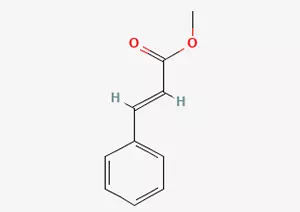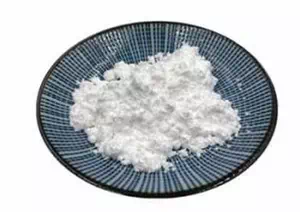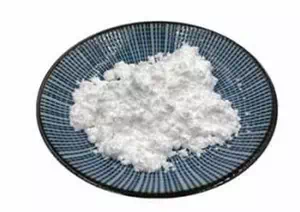Methyl Cinnamate CAS 103-26-4 Information
Chemical Name | Methyl Cinnamate |
Other Name | METHYL TRANS-3-PHENYLACRYLATE |
CAS | 103-26-4 |
EINECS | 203-093-8 |
Type | Food additives; Pharmaceutical raw materials; Organic raw materials; Flavors and fragrances; Plant extracts; Pharmaceutical intermediates |
Molecular Formula | C10H10O2 |
Molecular Weight | 162.19 |

Methyl Cinnamate CAS 103-26-4 Properties
Melting point | 33-38 °C (lit.) |
Boiling point | 260-262 °C (lit.) |
density | 1.092 |
vapor pressure | 0.73Pa at 25℃ |
refractive index | 1.5771 |
Fp | >230 °F |
storage temp. | Sealed in dry,Room Temperature |
solubility | Chloroform (Slightly), Methanol (Slightly) |
form | Fused Crystalline Mass |
color | White to light yellow |
Specific Gravity | 1.092 |
Odor | at 100.00 %. sweet balsam strawberry cherry cinnamon |
Odor Type | balsamic |
Water Solubility | insoluble |
What is Methyl Cinnamate CAS 103-26-4?
Methyl cinnamate is a white to slightly yellow crystal with a cherry-like aroma. Its melting point is 34℃, its boiling point is as high as 259.6℃, its refractive index (nD20) is 1.5670, and its relative density (d435) is 1.0700. This compound is soluble in ethanol, ether, glycerol, propylene glycol, and most non-volatile oils and mineral oils, but insoluble in water.
In nature, methyl cinnamate is widely present in various plants, including fruits such as strawberries, as well as some cooking spices like Sichuan pepper and certain varieties of basil. Among them, the concentration of methyl cinnamate in eucalyptus trees is the highest, reaching up to 98%, and the fresh weight of leaves and branches is 2-6%. In addition, the presence of methyl cinnamate has also been found in natural products such as basil oil, galangal oil and cinnamon leaf oil.
Overall, methyl cinnamate not only has a unique aroma and chemical properties, but also has broad application prospects in the fields of food, cosmetics and medicine. However, as it may have certain impacts on the environment and human health, the dosage must be strictly controlled during use and relevant regulations and standards must be followed to ensure safe and reasonable application.

Methyl Cinnamate CAS 103-26-4 Uses
Methyl cinnamate, as an important organic compound, has demonstrated outstanding performance in multiple fields, among which its powerful antibacterial ability is particularly prominent.
In terms of antibacterial properties, methyl cinnamate has a very strong antibacterial performance. Numerous professional and rigorous studies have shown that it can exert significant inhibitory effects on a variety of bacterial flora. For example, Staphylococcus aureus, a common bacterium that is prone to causing various infections, will have its growth and reproduction effectively inhibited under the action of methyl cinnamate. Escherichia coli, as a common flora in the human intestinal tract, may cause various health problems once imbalanced, and methyl cinnamate can also have an inhibitory effect on it. There is also Pseudomonas aeruginosa, a drug-resistant bacterium that is rather challenging in medical Settings. Methyl cinnamate can also limit its activity to a certain extent. Moreover, the antibacterial indications of methyl cinnamate are very extensive. It has potential application value in food preservation, medical and health care, and other related fields.
In addition to its excellent antibacterial performance, the antioxidant effect of methyl cinnamate is also quite significant. This is because its chemical structure contains rich substances such as active carbonyl groups and nitroso groups. These special active groups endow methyl cinnamate with a strong ability to scavenge free radicals. In the human body, free radicals are one of the main factors leading to oxidation reactions, and excessive oxidation reactions can cause damage to human cells and trigger various diseases. Methyl cinnamate can effectively resist oxidation reactions in the human body by eliminating free radicals, thereby maintaining the healthy state of cells and providing certain guarantees for human health.
Not only that, methyl cinnamate also has a very obvious anti-inflammatory effect. When the human body is stimulated by external factors or internal lesions trigger an inflammatory response, methyl cinnamate can exert its unique pharmacological effect and inhibit the inflammatory response in the body. Specifically, it can alleviate the fever symptoms caused by inflammation and relieve physical discomfort. Methyl cinnamate can also play a certain role in reducing swelling caused by inflammation. At the same time, it can effectively relieve symptoms such as pain and bring a sense of comfort to patients.
In terms of practical applications, methyl cinnamate has a wide range of uses. In the field of spices, it can be used as a fixative in the preparation of carnations and Oriental spices. In daily chemical products, methyl cinnamate also plays an important role and can be used as a fixative. For instance, in the production process of daily chemical products such as soap and detergent, it can be used to formulate daily chemical fragrances like rose, narcissus and incense, and also to blend the scents of lavender, carnation and clove, adding a unique aroma to daily chemical products. In the food industry, methyl cinnamate can be used as a food flavoring. For instance, in the process of making seasonings and pastries, it can be used to produce various food flavorings, such as strawberry, grape, cherry, peach, cream and vanilla flavorings, which not only enhance the flavor of food, but also to a certain extent meet consumers' demands for the taste and aroma of food.
Service
* Prompt reply and 24 hours online, professional team to provide best price and high quality product.
* Sample testing support.
* Every batch of products will be tested to ensureits quality.
*The packing also can be according the customers` requirment.
*Any inquiries will be replied within 24 hours.
*we provide Commerical Invoice, Packing List, Bill of loading, COA , Health certificate and Origin certificate. If your markets have any special requirements, let us know.








